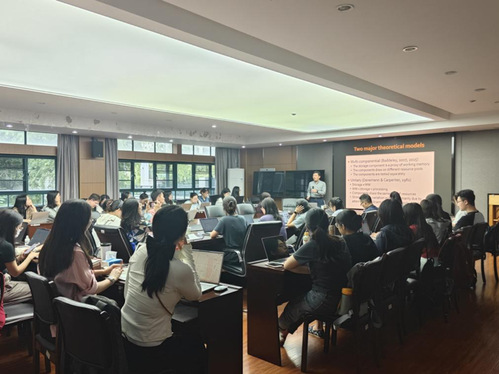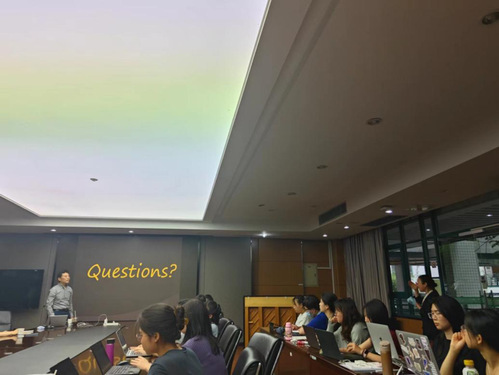On the afternoon of June 4th, one of the series of academic lectures organized by the Language Development and Assessment Research Center of the School of International Studies at Zhejiang University was held as scheduled at Rm. 201 of East Building 5. Prof. LI Shaofeng from Florida State University delivered a lecture titled “Working Memory and Second Language Acquisition: A Syntactic Review” moderated by Prof. WANG Min from the School of International Studies.
Prof. LI began by introducing the concept of working memory, highlighting that research on working memory has become a hot topic in the fields of psychology and second language (L2) acquisition, significantly impacting language learning. He then detailed the components, functions, and working principles of working memory. He pointed out that in the core processes of working memory, “Central Executive” acts as “CEO,” “Phonological Loop” as “inner ear,” “Visual-Spatial Sketchpad” as “inner eye,” and “Episodic Buffer” as “temporary information integration warehouse.”
Prof. LI elaborated on two major theories of working memory: Multi-componential Theory and Unitary Theory, and contrasted the differences in how these theories explain the various components of working memory. He introduced relevant theories applying working memory to L2 acquisition research, including the Interaction Hypothesis, Skill Acquisition Theory, Cognition Hypothesis, and Usage-based Theory, which provide a solid foundation for the extensive application of working memory in L2 acquisition research. Additionally, Prof. LI systematically reviewed different types of working memory measurement methods and commented on the current research of various working memory in specific skill areas of L2 acquisition.

Finally, Prof. LI provided a systematic summary of working memory research in L2 acquisition, indicating that future research needs to focus more on the roles of working memory in phonetics, vocabulary, listening, speaking, and writing. Moreover, the relationship between working memory and L2 proficiency requires further in-depth exploration.

The lecture was both informative and comprehensible, sparking the interest for discussion among the students and teachers present. During the Q&A session, questions are mainly about the dimensions of working memory measurement, the side effects of working memory, and methods to improve working memory, and Prof. LI patiently answered them in a professional and academic manner. The interaction sparked intellectual exchanges and benefited the attendees. The lecture concluded successfully amidst lively exchanges and questions.
Photos/ Text: LI Chengxin
Institute of Linguistics and Applied Linguistics, Zhejiang University
Language Development and Assessment Research Center, Zhejiang University
Translated by JI Yan, proofread by XU Xueying



